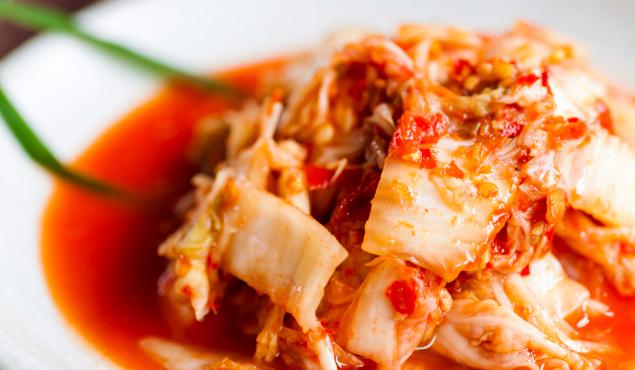 Have you ever fallen in love with a dish so much that you start to crave it regularly? Well at the moment, I heart kimchi and its powerful bad bacteria fighting properties. Kimchi is a spicy fermented cabbage that originates from Korea. It has a spicy, sour, awesome tangy flavor that really does it for me, but then again, I love pepper. Apparently this probiotic powerhouse historically has 187 different versions of it’s recipe. In Korea, where it is eaten with almost every meal, it helped protect against an epidemic of SARS back in 2003, and the same good bacteria available in kimchi even helped to restore Korean chickens who caught the H5N1 (avian flu) virus! That just gives you a bit of an idea of how gangsta kimchi can be in protecting against the worst kinds of viruses and bacteria and boosting your immune system. The lactic acid that produced during the fermentation process stops the growth of bad bacteria and is useful in the prevention of conditions such as yeast infections, urinary tract infections, obesity, diabetes, and gastrointestinal cancers.
Have you ever fallen in love with a dish so much that you start to crave it regularly? Well at the moment, I heart kimchi and its powerful bad bacteria fighting properties. Kimchi is a spicy fermented cabbage that originates from Korea. It has a spicy, sour, awesome tangy flavor that really does it for me, but then again, I love pepper. Apparently this probiotic powerhouse historically has 187 different versions of it’s recipe. In Korea, where it is eaten with almost every meal, it helped protect against an epidemic of SARS back in 2003, and the same good bacteria available in kimchi even helped to restore Korean chickens who caught the H5N1 (avian flu) virus! That just gives you a bit of an idea of how gangsta kimchi can be in protecting against the worst kinds of viruses and bacteria and boosting your immune system. The lactic acid that produced during the fermentation process stops the growth of bad bacteria and is useful in the prevention of conditions such as yeast infections, urinary tract infections, obesity, diabetes, and gastrointestinal cancers.
Nutrition-wise kimchi is low in calories and sugar but contain high amounts of fiber, vitamins A and C, and minerals such as calcium and iron. It also has high levels of beta carotene and after undergoing three weeks of fermentation the levels of B1, B2, and B12 double. In addition to all this groovy nutrition kimchi can help to reduce indigestion and gas by ridding the body of excess bad bacteria, and also help you feel fuller because the good bacteria in the gut stabilizes blood sugar levels and keeps from intense hunger pangs and cravings. For those non-dairy eaters like myself, it’s also good to know that kimchi contains more good bacteria than yogurt. Another win for the dairy-free team.
Most kimchi that is readily available at Asian grocery stores are most likely NOT vegan as they may use anchovy in the process. If you are interested in trying this spicy old cabbage dish, you can find gluten-free and vegan versions of kimchi with varying levels of spiciness at natural food stores that are pretty awesome or try making it on your own so you can have larger quantities. After the initial fermentation process, kimchi lasts anywhere from three to six months in the fridge and with time the amounts of good bacteria available continue to increase. The process is pretty intense and traditionally the cabbage is buried in the ground during the fermentation process. Um, since that isn’t happening for most of us (raises hand) you can leave it out in your kitchen shortly and then put it in the fridge. In the next few weeks I’ll be working on my own sauerkraut and kimchi recipes and will be sure to report back when I’ve reached the fermented cabbage promise land. Until then, make sure to include probiotics and fermented foods in your diet. I will highlight more soon on the blog. They are super important and can help you achieve balance quickly when dealing with candida, parasites, indigestion, and even acne. -XoXo Raw Girl





